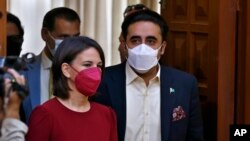Germany urged the global community Tuesday to collectively tell Afghanistan's Islamist Taliban rulers that they "are heading in the wrong direction” and called for strictly linking any economic aid for the war-torn country to the human rights of Afghans.
“The situation is dire and the Taliban are leading the country into a downfall,” German Foreign Minister Annalena Baerbock told a news conference during a visit to neighboring Pakistan.
“Our influence on what happens inside Afghanistan is very limited. It depends on the Taliban making rational choices in their own economic interests and that is not what they are doing right now,” Baerbock said.
The insurgent-turned-Islamist rulers seized power from the now defunct Western-backed government in August as U.S.-led international forces withdrew from Afghanistan following almost two decades of fighting with the Taliban.
The interim male-only Taliban cabinet has rolled back many human rights Afghans enjoyed over the past 20 years, particularly those of women. It has suspended secondary education for most teenage girls and prevented female employees in some government departments from returning to their jobs.
The Ministry for Vice and Virtue, tasked with interpreting and enforcing the Taliban’s version of Islam, has ordered women to cover up fully in public, including their faces, and barred them from traveling beyond 70 kilometers unless accompanied by a male relative.
Baerbock criticized the restrictions, saying they have “almost excluded” women from participation in public life.
“The international community must stand united and together tell the Taliban loud and clear; you are heading in the wrong direction,” she said. "As long as they go down this path there is no room for normalization and even less for recognition of the Taliban as the legitimate rulers of the country.”
No country has yet recognized the new Taliban government, citing concerns the Islamist group has reneged on pledges it would respect rights of all Afghans and prevent terrorist groups, including al-Qaida, from using the country for international attacks.
An already bad humanitarian crisis in Afghanistan has worsened since the return of the Taliban to power in Kabul in the wake of international financial sanctions on the group, pushing the national economy to the brink of collapse.
Baerbock acknowledged that the Afghan economy was grinding to a halt and advocated sustained humanitarian assistance to Kabul, saying it was not the Afghan people's fault that their government was overthrown by the Taliban.
“But anything else above humanitarian aid must be strictly conditionalized,” the German foreign minister emphasized.
Baerbock thanked Pakistan for evacuating and facilitating the transit of more than 14,000 at-risk Afghans to Germany since the fall of Kabul to the Taliban. The refugees served German troops during their stay in Afghanistan.
Pakistani Foreign Minister Bilawal Bhutto Zardari, while speaking at the joint news conference with the German counterpart, urged the world to actively engage in preventing the brewing humanitarian crisis in Afghanistan threatening lives of the country’s 40 million people. He also called on the Taliban to take steps to address international concerns about the rights of Afghans.
"It is our hope that the Afghan authorities will be responsive to the expectations of the international community, including inclusivity, respect, human rights for all, including women and take effective actions against terrorism,” Zardari said.
For their part, the Taliban have urged the world to “show respect” for Afghan values and rebuffed calls for reversing restrictions on women, saying they are in line with local religious and cultural values.
The Taliban have said public secondary schools are open in about a dozen out of 34 Afghan provinces and efforts are underway for allowing girls to return to their classes across the country. They insist a of Afghan female civil servants, or 120,000, have returned to work, included 94,000 in the education ministry and 14,000 in the health ministry.
Baerbock arrived in Islamabad on her maiden two-day tour and met with Zardari as well as other Pakistani officials but she canceled rest of her activities after testing positive for COVID-19.




